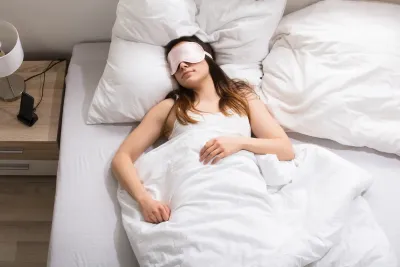Why Waking Up to a Loud Alarm Might Be Wrecking Your Health
Sleepme Editorial Team • May 14, 2025

Key Takeaways
- Blood Pressure Surge: Waking abruptly can increase morning blood pressure by 74%.
- Chronic Stress: Regular exposure to jarring alarm clocks can elevate cortisol levels, contributing to long-term stress and anxiety.
- Sleep Inertia: Sudden awakenings can cause grogginess and impaired cognitive function.
- Weight Gain Correlation: Disrupted sleep patterns from loud alarm clocks have been linked to weight gain.
- Gentler Alternatives: Gradual waking methods can improve overall well-being.
That blaring beep or screeching ringtone pulling you out of dreamland each morning might be doing more than just waking you up—it could be quietly working against your health. While loud alarm clocks are a morning staple for many, science says they could be messing with more than just your mood, they may be spiking your blood pressure, throwing off your hormones, and triggering stress responses before you even brush your teeth.
Research shows that abrupt awakenings can jolt your cardiovascular system, flood your body with cortisol, and derail your circadian rhythm, all of which add up to long-term health consequences. From groggy mornings to an increased risk of chronic conditions, the way you wake up matters more than you think.
Before you hit the snooze button again, let’s dive into what happens inside your body when your alarm sounds off like a fire drill, and what you can do instead to rise and shine the healthy way.
Tip: Select a gentler sound for your phone alarm or app if possible.
Learn more to find out if hitting the snooze button is helping or hurting your sleep?
Ease Into Your Morning, Naturally
Say goodbye to blaring alarms and hello to a gentler way to rise. The Chilipad Dock Pro’s Warm Awake feature gradually warms your bed to wake you up naturally—no noise, no stress, just a smoother start to your day.
The Impact on Blood Pressure
A study led by Yeonsu Kim at the University of Virginia uncovered some eye-opening data on loud alarm clocks and blood pressure. Participants jolted awake by an alarm saw a dramatic 74% spike in their morning blood pressure compared to those who woke up naturally, proving that your blaring alarm might be more than just a rude awakening.
That spike in blood pressure isn’t just a number. It’s a serious red flag linked to a higher risk of heart attacks and strokes. In the study, participants wore smartwatches and blood pressure cuffs, giving researchers a clear look at the physical stress caused by being abruptly pulled out of sleep.
So, what’s happening inside your body? The sympathetic nervous system controls your fight-or-flight response and goes into high gear when you're suddenly awakened. This stress surge can lead to symptoms like fatigue, anxiety, and shortness of breath, adding even more health concerns to your morning routine.
Chronic Stress
Waking up to a blaring alarm doesn’t just rattle your nerves—it can mess with your hormones, too. Repeated exposure to loud, jarring alarms can spike cortisol, the body’s main stress hormone. Elevated cortisol levels are tied to chronic stress, anxiety, and even depression. That sudden jolt triggers your sympathetic nervous system, flooding your body with adrenaline and setting off a full-blown stress response.
Over time, this daily shockwave can lead to chronic stress, which is no small thing. It’s been linked to serious health problems like heart disease, digestive issues, and mood disorders. Plus, long-term stress can cloud your thinking and throw off your emotional balance, making it harder to focus, cope, and connect.
The ripple effects of a loud alarm clock reach far beyond just a cranky morning. Over time, they can seriously impact your overall health, cognitive function, and quality of life.
Sleep Inertia: The Grogginess Factor
Waking up to a loud alarm can do more than startle you—it can drop you straight into sleep inertia. This is that heavy, brain-foggy state where thinking feels slow, mood takes a hit, and everything just feels…off. It can stick around for up to four hours after waking, especially if your alarm cuts into deep sleep.
Did You Know: Waking up from deep sleep is no easy task—it’s much tougher than rising from light or REM sleep stages.
Studies show the mental fog from sleep inertia can rival the cognitive impairment of being mildly intoxicated. Not exactly the sharpest way to start your day. That’s why how you wake up matters. A gentler transition from sleep to wakefulness can help clear the mental cobwebs and set the stage for a more productive, focused day.

Weight Gain Correlation
Loud alarm clocks don’t just jolt you awake—they can also throw your sleep off enough to mess with your metabolism. When your sleep is disrupted, it affects key hormones like ghrelin and leptin. Ghrelin ramps up your appetite, while leptin tells your brain you’re full. When these signals get scrambled, cravings kick in and it’s easier to overeat.
On top of that, poor sleep can slow down your metabolism, making it harder to burn calories efficiently. Research shows that people who deal with frequent sleep interruptions, especially from harsh alarms, are more likely to gain weight and face related health issues.
If you're aiming to maintain a healthy weight, consistent and quality sleep isn’t just helpful—it’s essential.
Circadian Rhythm Disruption
Your body runs on a built-in schedule known as the circadian rhythm. It functions like an internal clock, managing everything from sleep and energy levels to hormone production and metabolism. Loud, jarring alarms can interrupt this natural rhythm by forcing you awake before your body is ready.
This disruption, called circadian misalignment, can lead to more than just feeling off. It has been linked to sleep disorders, metabolic issues, and even long-term health problems. You may notice it as poor sleep quality, constant fatigue, trouble concentrating, or just feeling out of sync with your day.
Maintaining a healthy circadian rhythm starts with how you wake up. Gentle methods like light alarms or smart clocks that monitor your sleep cycles can help ease the transition from sleep to wakefulness. Aligning your mornings with your body’s natural rhythm can support better sleep and overall well-being.
Long-Term Health Risks
Loud alarm clocks don’t just rattle your mornings—they can quietly chip away at your long-term health. Regular exposure to harsh alarm apps or clocks can keep your cortisol levels elevated, which has been linked to high blood pressure, insulin resistance, and cardiovascular disease.
Feeling sleep deprived from being jolted awake? That rude awakening could be throwing your metabolism off track, too. It affects hormones that control hunger and fullness, which increases the chances of overeating and weight gain over time.
When your circadian rhythm gets thrown off by abrupt awakenings, it can lead to a cycle of fatigue, poor sleep, and increased health risks. What starts with a loud alarm can turn into a long-term pattern that works against your well-being.

Alternatives to Loud Alarm Sounds
If the blaring alarm clock is doing more harm than good, it might be time to rethink your wake-up routine. Gentler, more tech-forward options can help ease you into the day without the shock.
One standout solution is the Chilipad Dock Pro with its Warm Awake feature. Instead of a sudden noise, it gradually warms your bed to mimic the natural rise in body temperature that comes with sunrise. This gentle wake-up method helps your body transition out of sleep more smoothly and starts your morning on a calm, relaxed note—no jolts required.
Additional Alternatives
- Light Alarms: Alarm apps and clocks that gradually increase in brightness to mimic natural sunlight.
- Smart Alarms: Devices that monitor sleep cycles and wake you during lighter sleep stages.
- Vibrating Alarms: Wearable devices that gently vibrate to wake you without sound.
- Nature Sounds: Alarm clocks that use soothing alarm sounds, such as birds chirping or ocean waves, to wake you gradually.
- Consistent Sleep Schedule: Going to bed and waking up at the same time every day to regulate your internal clock.
These alarm alternatives can help individuals wake up feeling more refreshed and less stressed, ultimately promoting better health.
Did You Know: Research shows the most effective alarm sounds tend to be low-frequency tones around 500 Hz, melodic tunes, and songs with a tempo between 100 and 150 beats per minute.
Final Thought
Waking up to a loud alarm clock may seem like a necessary part of modern life, but the health risks associated with this practice are significant. From increased blood pressure and chronic stress to sleep inertia and long-term health issues, the consequences of abrupt awakenings can be detrimental.
The Chilipad Dock Pro with its Warm Awake feature offers a gentle and effective alternative, allowing individuals to wake up gradually and naturally. By exploring gentler waking methods and prioritizing sleep health, individuals can improve their overall well-being and reduce the negative impacts of loud alarm clocks.
Frequently asked questions
Why Are Loud Alarms Bad for Your Health?
Jolting awake to a blaring alarm sounds triggers your body’s stress response—spiking cortisol, increasing heart rate, and launching you out of sleep like a fire drill, not a peaceful wake-up.
Is There a Better Alternative to a Loud Alarm Clock?
Absolutely. Smart sleep tech is stepping in to change the game. Devices like the Chilipad Dock Pro offer features like Warm Awake, which gradually warms your bed to gently nudge you out of sleep—no beeping, buzzing, or panic required.
What Are the Healthier Ways To Wake Up Naturally?
Give your nervous system a break and try these:
- Use the Warm Awake feature on the Chilipad Dock Pro
- Try sunrise alarms that mimic natural light
- Stick to a consistent bedtime and wake-up routine
- Use gentle soundscapes or vibration-based alarms
- Sync wake-up times with sleep cycles using smart trackers
Can Alarm Clocks Affect Your Health?
Yes—and your body knows it. Jarring alarm clocks can spike your heart rate, elevate cortisol, and yank you out of deep sleep too abruptly, leaving you groggy and stressed. Over time, this daily shock to the system may disrupt your circadian rhythm and impact your mood, focus, and even cardiovascular health.
A gentler wake-up—like gradually increasing light or soothing sounds—can help your body ease into the day without the rude awakening.
Why Does My Heart Race When the Alarm Goes Off?
Because your alarm isn’t just waking you up—it’s launching a full-on stress response. When a loud or sudden alarm yanks you out of sleep, your brain reacts like there’s an emergency. That triggers your sympathetic nervous system (aka your fight-or-flight mode), flooding your body with adrenaline and increasing your heart rate. It’s a natural defense mechanism—but not exactly the gentlest way to start the day.
A more gradual wake-up method can help your body rise without the panic.









